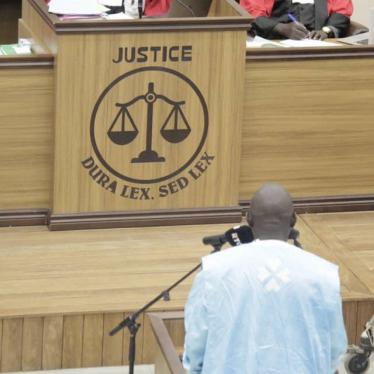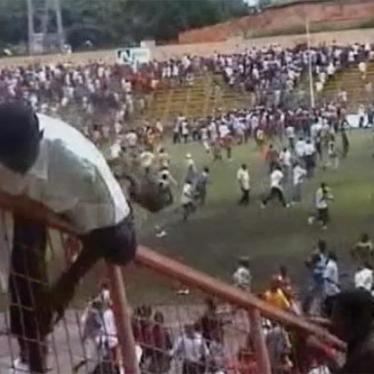Over the past month, Guinea’s landmark trial around the country’s horrific 2009 stadium massacre entered a new phase as seven witnesses, including former high-level government officials, testified. Judges already have heard from each of the 11 accused, including Guinea’s former president, Moussa Dadis Camara, and more than 100 victims, including victims of sexual violence.
The massacre was one of the most brutal incidents in Guinea’s history. Security forces opened fire on peaceful protesters at a stadium in the country’s capital, Conakry, on September 28, 2009. More than 150 people were killed and dozens of women suffered brutal sexual violence. Afterwards, security forces engaged in an organized cover-up and transferred bodies to mass graves.
The former chief of the armed forces’ general staff, the gendarmerie’s chief of staff, the general director of the police, and the former adviser of the president are among the witnesses. Some have testified about orders officials received on the eve of the massacre or have offered information related to officials sending military vehicles to transfer the bodies of demonstrators from the stadium after the attack. In total, more than 40 witnesses are expected to testify.
The trial’s recent progress follows an unprecedented incident. On November 4, four of the highest-level accused, including former President Dadis Camara, left the detention facility with armed forces. There are conflicting reports as to whether this represented an escape or a kidnapping. Three of the four accused returned to custody the same day. The fourth, Claude Pivi, a government minister during the massacre, remains a fugitive.
Victims who had taken the stand in the trial publicly raised concerns for their safety while the accused were at liberty, and security at the prison is evidently a major challenge. According to trial monitoring organized by Human Rights Watch and news coverage, lawyers involved in the proceedings also have described facing security threats.
Guinea’s international partners, including the European Union, United States government, United Nations human rights office and the UN’s team of experts on sexual violence in armed conflict, along with the International Criminal Court Office of the Prosecutor, should engage Guinean authorities to ensure that recent challenges, especially relating to security for victims, lawyers and the accused, are surmounted. Justice is vital for the victims and their families who deserve to see perpetrators held to account. Additionally, an effective trial can help inspire more domestic trials of atrocity crimes wherever such crimes are committed.





